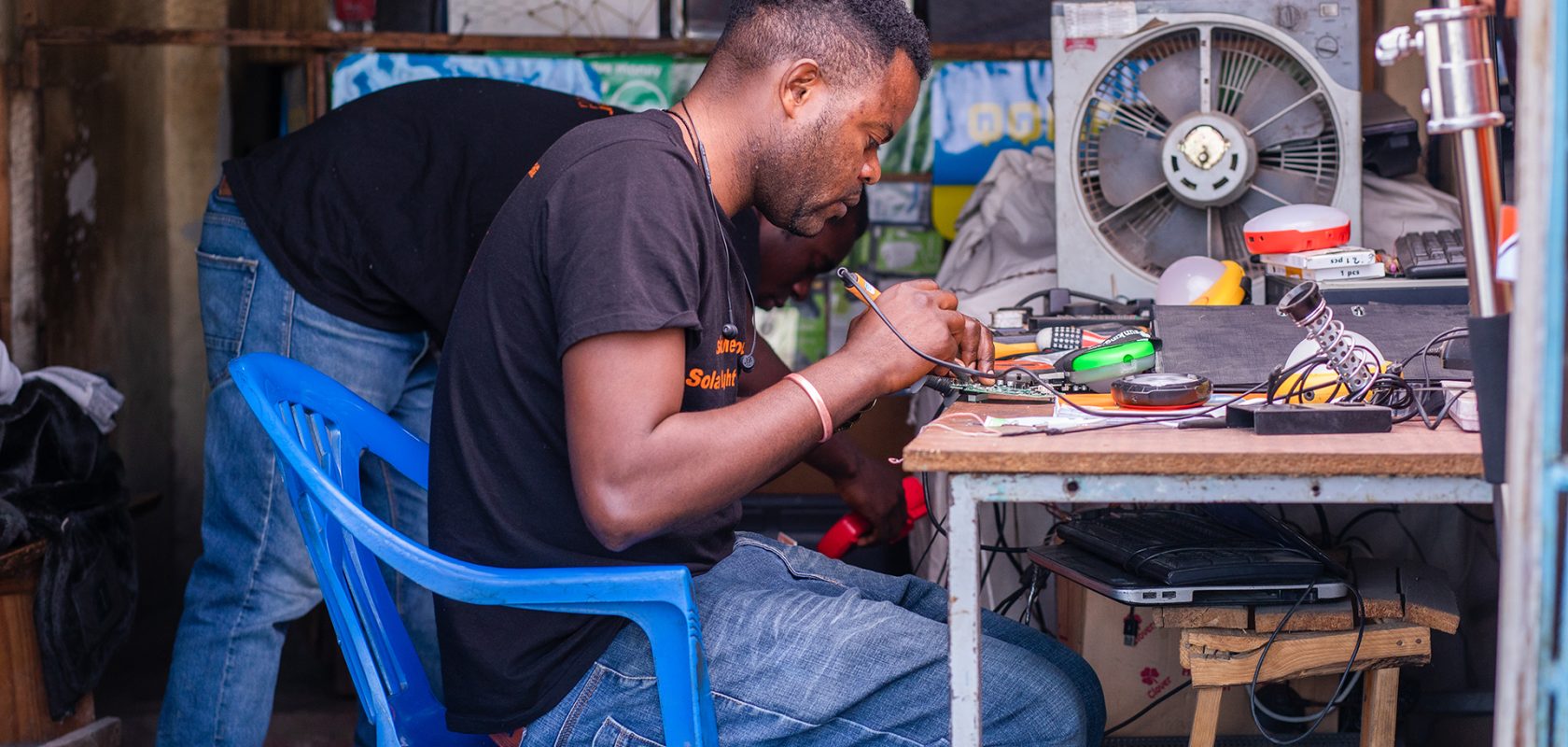In the rural parts of Zambia where most families lack access to electricity, being able to flick the switch on the small, handheld solar light will, in many cases, be the deciding factor between being in pitch black after sunset, or if there are still hours of working, studying and socialising to enjoy.
But what happens when a solar light fails? While today’s solar lights last longer than ever before, like all electronic devices, at some point they stop working. That is why SolarAid launched its e-waste project which not only explores how to safely discard of electronic waste such as solar light, but also developing capacity of local technicians to repair common solar lights faults. This means that customers can continue enjoying clean, safe and affordable solar light even longer, and faulty products will not end up contributing to the growing problem of electronic waste.
37 year old repair technician Brian Nongo has been working as a repair technician for 20 years. In 2022, he was recruited by SolarAid to start working with the repair of solar lights in the area of Serenje.
For the Repair Days in August 2022, Brian has set up his table in an open area outside of the Primary School where customers can come and get their faulty lights diagnosed and fixed.

Repair Technician Brian Nongo and his assistant Edson Mwelwa fixing a lamp at a repair day in Serenje.
70 year old Mwitwa Bwalya is one of the customers who has come to get her solar light repaired. She heard about the Repair Days through the church, “I have been using solar lights for more than 5 years now. I use the light at home and sometimes the children use it for studying at night. The light just stopped getting on and I obviously felt bad because it meant that we would stay in the dark when it was evening.”

Mwitwa Bwalya who had her lamp fixed at the repair day.
Nicolaus Mwewa who is another customer, normally uses his light to charge his phone and to light up his home in the evening. But he has noticed it going dim lately and wanted to get it diagnosed, “For the light that I have come with, the lighting just reduced. So I want to have it checked. I felt bad about it, but I wasn’t worried, because I knew about the repair days (…) Because I am a regular customer, I was directly contacted by SunnyMoney that they will be coming for repairs.”
“These lights have brought so much development in my area and have prevented many accidents which could have happened due to fires. The lights have cut down our costs towards candles, batteries and kerosene,” he continues.

Customer Nicolous Mwelwa who knew about the repair days.
In an area like Serenje, where the consequences of climate change are notable as well as where a large part of the population live without access to electricity, Brian is convinced the need for renewable solutions, such as solar lighting, is necessary, “I’ve seen for myself the effects, especially changes in rainfall patterns. Aside from affecting the agricultural sector, receiving less rainfall for Zambia also affects power supply in the country as it would entail a reduction in water levels at the Kariba Dam. This would result in load shedding across the country.”
Mwitwa Bwalya agrees, “The weather now is so different compared to 5-10 years ago. For instance, the rainfall pattern has changed; rains do not start in October like before, it is now at the end of November or even January. And sometimes, we even experience drought.”

Repair Technician Brian Nongo putting a new battery in a solar lamp.
Being able to repair solar lights is therefore a step in the right direction. It means more people benefitting from clean light, and it will also help with building resilience to the effects of climate change, while at the same time – reducing the amount of e-waste being discarded, something that is easier said than done in rural parts of Zambia where recycling is minimal. “I use some as spare parts but for batteries, I keep them and wait for SolarAid staff to collect them and take them for safe disposal in Lusaka. Any battery is a danger to the environment and should be disposed of properly. Therefore, I advise my customers not to dispose of batteries into the environment but bring them to me so that they are disposed of well with SolarAid in Lusaka,” explains Brian.
Nicolas Mwewa adds, “I am aware that electronic waste can be harmful to the environment and that’s why I don’t just throw it anyhow. I also encourage people not to dispose of electronic waste anyhow. Climate change is real, and we can all see its effect. For electronic waste, having a recycling company close by, would help protect the environment.”

Opened solar lights awaiting repair.
For Brian, he now sees even more opportunities with solar lights, “Aside from being a repair technician, I would also want to become an agent to sell the lights as I can build a market through these repairs. I also plan on purchasing a motorbike to help me supply the lights to other areas when I become an agent.”
“I want to give words of appreciation for bringing this repair programme closer to us, at least our lights will now be coming back to life. I am happy,” says Mwitwa.
